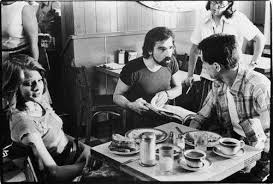SCHRADER, DE NIRO, SCORSESE, MORE TALK TO THE HOLLYWOOD REPORTER
 Martin Scorsese's Taxi Driver was released 40 years ago, and will get a special screening Thursday, April 21, at the Tribeca Film Festival in New York. Ahead of that, last week The Hollywood Reporter posted an "oral history" of the film. In the following excerpt from the beginning of the article, screenwriter Paul Schrader, producer Michael Phillips, and Scorsese discuss how they became involved, noting the important role Brian De Palma played in suggesting the right person to direct the picture:
Martin Scorsese's Taxi Driver was released 40 years ago, and will get a special screening Thursday, April 21, at the Tribeca Film Festival in New York. Ahead of that, last week The Hollywood Reporter posted an "oral history" of the film. In the following excerpt from the beginning of the article, screenwriter Paul Schrader, producer Michael Phillips, and Scorsese discuss how they became involved, noting the important role Brian De Palma played in suggesting the right person to direct the picture:PAUL SCHRADER (screenwriter) I had a series of things falling apart, a breakdown of my marriage, a dispute with the AFI, I lost my reviewing job. I didn't have any money and I took to drifting, more or less living in my car, drinking a lot, fantasizing. The Pussycat Theater in L.A. would be open all night long, and I'd go there to sleep. Between the drinking and the morbid thinking and the pornography, I went to the emergency room with a bleeding ulcer. I was about 27, and when I was in the hospital, I realized I hadn't spoken to anyone in almost a month. So that's when the metaphor of the taxi cab occurred to me — this metal coffin that moves through the city with this kid trapped in it who seems to be in the middle of society but is in fact all alone. I knew if I didn't write about this character I was going to start to become him — if I hadn't already. So after I got out of the hospital, I crashed at an ex-girlfriend's place, and I just wrote continuously. The first draft was maybe 60 pages, and I started the next draft immediately, and it took less than two weeks. I sent it to a couple of friends in L.A., but basically there was no one to show it to [until a few years later]. I was interviewing Brian De Palma, and we sort of hit it off, and I said, "You know, I wrote a script," and he said, "OK, I'll read it."MICHAEL PHILLIPS (producer) [My then-wife] Julia and I were living on Nichols Beach, and our next-door neighbors were Margot Kidder and Jennifer Salt, and Brian De Palma was living with Margot at the time. Brian said to me one day, "There's this guy who has written a screenplay. It's not really for me, but I think it's your taste." It was incredibly pure, a very honest piece of work. So I went to my two partners at the time, Julia and Tony Bill, and proposed we acquire it for $1,000, and by a two-to-one vote — Tony and I voted to acquire it, and Julia voted against it — we acquired the option.
MARTIN SCORSESE (director) Brian gave me the script. I reacted very viscerally, almost mystically to it and its tone and the struggle of the character. But I was still trying to get them to take me seriously as a filmmaker. I'd done a low-budget independent film called Who's That Knocking [at My Door] and an exploitation film for Roger Corman called Boxcar Bertha. I liked Julia a lot, but she kept pushing me away, dismissive, but funny. She'd just tell me, "Come around again when you've done something more than Boxcar Bertha."
PHILLIPS It took several years to get made. One day Paul suggested we see a rough cut of [Scorsese's] Mean Streets, and midway through, I really felt this is our guy. Johnny Boy [played by Robert De Niro] is our actor. So we made a proposal to Marty and Bob's agent. They both had to do it or neither. I mean it was silly, in retrospect.
ROBERT DE NIRO (Travis Bickle) We all liked the script a lot and wanted to do it and were committed to it.
MICHAEL CHAPMAN (cinematographer) I realized years later that it's a kind of folk tale or urban legend. It's a werewolf movie in a weird way. Even his hair changes. There are these things that are wandering around in the night that are dangerous. In this case, the werewolf saves the girl, instead of killing the girl.
PHILLIPS We went about trying to shop it, and it was rejected. Then Marty went off to do Alice Doesn't Live Here Anymore and Bobby went off to do Godfather [Part II] and 1900.
SCORSESE I remember Robert De Niro winning that Oscar for Godfather: Part II. That night Francis Coppola accepted for Bob, who was shooting another film, and I was there, and Francis told me, "It's going to be good for your film."



